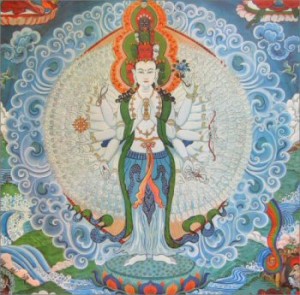An excerpt from a teaching by Jetsunma Ahkon Lhamo from the Vow of Love series
In the Vajrayana tradition one contemplates very deeply on certain thoughts before you ever go on to any deeper practice, and these thoughts are called the ‘Four Thoughts that Turn the Mind.’ The idea is that your mind becomes turned in such a way that your intention to practice is firm, like a rock. If you were wishy-washy about why you should practice meditation, your meditation will be wishy-washy. There’s no doubt about it. If you were convinced that your job could bring you more eternal and natural happiness than enlightenment, you would practice your job with greater fervor than you would practice enlightenment. Therefore you try to turn your mind so that it has a firm foundation, hard as a rock, upon which you can build your practice.
It’s that way with aspirational Bodhicitta. You have to turn your mind in such a way that you understand the value of compassion and you have to actually ignite your mind. You have to set it on fire, and that fire has to be stronger and hotter and fiercer than any other feeling or idea that you have. It has to burn so strongly that you can’t put it out.
In order to practice aspirational Bodhicitta, you must first of all look around you with courage. Because we Americans, even New Age Americans, don’t like to look around and see that others are suffering. We hate to think about that. We think somehow it’s bad to think like that. According to the Buddha, it isn’t bad to think like that. In fact, you must think like that in order to go on to the next level of practice. You must look around you and be honest and be courageous. If you don’t see suffering in your life, if you don’t know that the people around you are lonely or getting old or getting sick, that they live with worry and with fear, then what you need to do is go to the library and check out books about other cultures and other forms of life, and see what the rest of the world is like. Have you ever seen pictures of Calcutta, India? Have you ever seen pictures of Bangladesh? Have you ever seen pictures of Africa? If you don’t believe that suffering exists in the world, you’ll see it there. Have you ever studied the lives of people who continually do non-virtuous activity? Even though they might look like they’re tough and in control, they are deeply suffering. It behooves you to be courageous enough to examine that. You should look at other life forms. You should look at animals. You should look and see how oxen are treated in India. I speak of India a lot, not because it’s a bad place, but because I’ve been there, and I was shocked. I had no idea how sheltered Americans are from suffering. I had no idea until I saw lepers in the street with no limbs and with open sores.
Having studied these things, you will come to understand that there is suffering in the world. You should cultivate in your heart and mind a feeling of great compassion. You shouldn’t stop until you’ve come to the point that you are on fire and you cannot bear that they are suffering so much. The Buddha says that we have had so many incarnations in so many different forms that every being you see, every one, has been your mother or your father. Whether you believe that or not, it’s a great way to think. Because you look at other beings and see how they are suffering helplessly, with no way to get out of it. And that they, at one time, had given you birth. In that way, you can come to love them in a way that you can practice for them.
You should allow yourself to become so filled with the urgency to practice loving that your heart is on fire and there’s no other subject that interests you as much. Even if it’s uncomfortable; we Americans think we should never be uncomfortable. Sometimes discomfort is very useful. Be uncomfortable and let yourself ache with the need to practice Bodhicitta. Cultivate in yourself that urgency and that determination. You might get to the point where you feel something, and you feel sort of sorry for all sentient beings. You might think, “Okay, now I’ve got it. I’ll go on to the next step.” No, you haven’t got it. You should cultivate compassion from this moment until you reach supreme enlightenment.
Unless they are supremely enlightened no one is born with the perfect mind of compassion. I, and everyone I teach and everyone I know, including my teachers, practice aspirational Bodhicitta everyday, reminding ourselves that all sentient beings suffer unbearably and that we find it unbearable to see. You should continue to cultivate compassion every moment of your life. It will begin to burn in your heart. It’s like love. It’s beautiful. You won’t want ever to be without that divine fire in your heart. It will warm you as no other love can. It will stabilize your mind as no other practice can.
© Jetsunma Ahkön Lhamo











